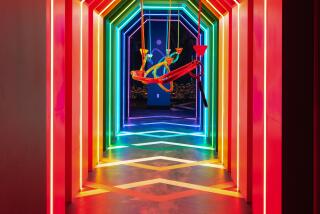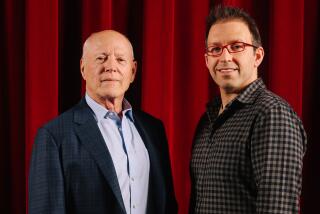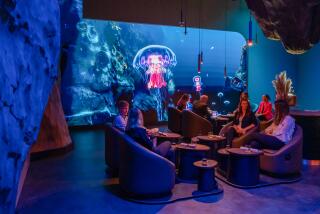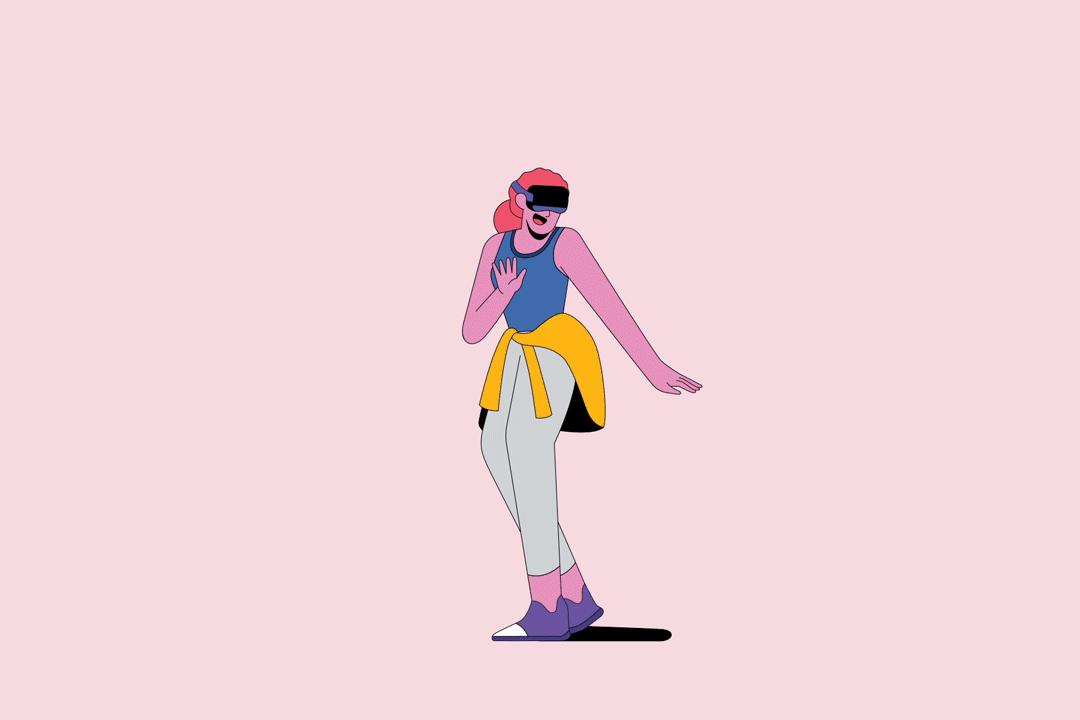
Virtual reality isn’t just for gamers. Artists, exercise fiends and actors in a new theater form are experimenting now. And in experiences that have become more responsive, the player is no longer passive. Yes, the headsets still cost too much, but the promises of VR are closer than they’ve ever been. And during coronavirus-forced social isolation, they bring alternate realities in anxious times. TODD MARTENS and DEBORAH VANKIN report on the innovations.
How I broke my VR skepticism and found emotional escape during coronavirus sheltering
ALL IT TOOK to make me a believer of virtual reality was for reality to break.
This was the thought I had after about 45 minutes inside my VR headset on a Monday afternoon. I had barely moved. A forest surrounded me. A bird sat perched on a tree branch. My hand held a video game controller. But what I saw was a futuristic airbrush, a laser-like paint sprayer that looked like a prop from a 1940s sci-fi film.
A touch of a button and I could color the world. The bird before me was purple. Then it was pink. Then blue. Then pink again. I shot the feathered creature with random color as if I were Flora, Fauna and Merryweather all in one, toying with the chroma of the universe as if I alone possessed the power of the fairy godmothers of “Sleeping Beauty.”
Games are a playground, a place to see what happens when we do what we aren’t told, and a world in which failure is embraced — welcomed, even — as a way to learn. Why play matters in times of stress.
Soon the alarm on my smartphone sounded. This was my cue to remove the VR headset and flip on the radio to listen to another sobering address from Mayor Eric Garcetti. I sat and stared as L.A.’s mayor spoke, my eyes tracing a scratch on my coffee table. Illuminated by the late afternoon sun, the wear had long escaped my vision. Having spent the day in a heightened version of reality, I was suddenly more attuned to my very real, very dusty surroundings. The enchanted world of “Color Space” seemed very far away. …
Home, in this head space, is not a place to play; it’s a place to hide out, at least until the pandemic comes to an end — or a declining market leads to an eviction. Which comes first right now feels like something of a toss-up. My home is no longer comforting.
In this moment, I found virtual reality. And, to be sure, I had been skeptical. … READ MORE
Art Reality Studio arms artists with VR gear and asks: What if?
WE ARE INSIDE Keith Tolch’s brain. As in, walking around.
It’s a futuristic landscape, a maze of empty rooms with soaring ceilings and glowing, neon-lit floors, everything bathed in an ‘80s-era palette of screaming-pink, orange and lime green. Random objects — a deconstructed 1967 Mustang, glass cubes brimming with swirly paint markings, delicate pencil drawings of butterflies and roosters — float by.
But, wait. Disrobed of the plastic, padded headset, we are actually in a gleaming Eagle Rock warehouse, a former auto body repair shop-turned-artists’ studio, and Tolch is perched behind a computer console, beaming.
His piece, “Glass Bottom Brain,” is an interactive, virtual reality artwork — meaning viewers don a high-resolution headset and descend into an immersive, 3-D digital environment in which they can navigate through bits and pieces of Tolch’s subconscious. He created the piece with expensive state-of-the-art computer equipment, but Tolch didn’t invest a cent. The project was paid for, organized by and later exhibited by Art Reality Studio, a nonprofit organization that’s outfitting contemporary artists with VR technology toward pushing creative boundaries. It sees itself as an incubation lab for cutting-edge creativity and asks the question: “What if?”
“What happens when artists are given cutting-edge technology, no strings attached?,” says ARS co-founder Frank Masi. “We wanna see how far they’ll take it.” … READ MORE
Actors sheltering at home perform in live VR experiences, making case for new theater form
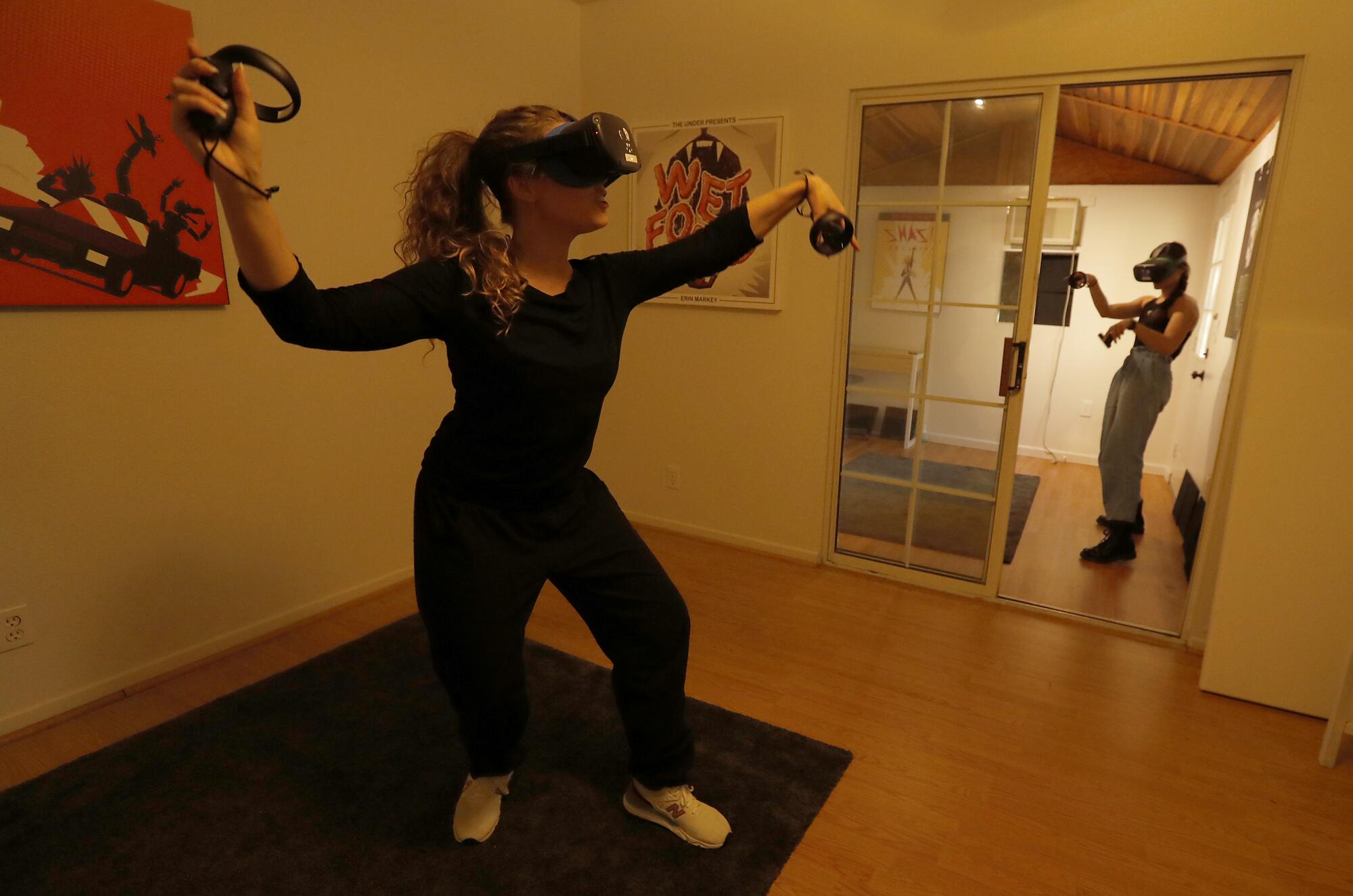
LAST WEEK, ON the verge of being late for a work-related call, I stumbled upon a group of strangers. One of them snapped their fingers near my face. Another tossed me a sword.
But I didn’t run. In the virtual reality world of “The Under Presents,” these actions are tantamount to instant friendship. I admired the sword but set it aside when I spotted an inner tube, knowing that there would be no fighting here. Besides, the pool equipment would be better for an impromptu dance party, which can happen regularly in “The Under Presents.” The work call would have to wait.
A woman who looked to be nearly 15 feet tall commandeered our attention. She said we should all say hello to her new friend named “Rice Krispie Treat” and then she asked if we could do a group hug. If there was any doubt that this was not your standard video game character and was instead a creation being puppeteered by a very-real actor, it was about to become apparent.
“We can’t hug out there right now,” she said, alluding to our current health crisis, “so we may as well do it in here.”
Starved for company, let alone the community offered by a friendly embrace, I stretched out my arms and leaned forward, my left hand hitting the coffeemaker in my kitchen as I did so.
Today, however, in a world struggling to balance life, finances and the arts with measures to slow the spread of a vicious virus, “The Under Presents” feels more like a statement piece. It shows one potential way forward, a future where the worlds of home technology and theater coalesce to build not just fresh experiences but carve out new business models.
Tender Claws is seizing the moment.
Its stable of 18 live actors … has been extended full time through the end of May, and part time at least through July. … Ultimately, “The Under Presents” works because it re-imagines theater for the game space. While not a replacement for live, it is another avenue for performance, and it’s medium-specific work that was built specifically for the home, offering one answer to a question that is no doubt vexing many right now: What options are there for live performance when we can’t gather in the same space? … READ MORE
If it weren’t for virtual reality games, I wouldn’t be getting exercise right now
LIKE A NEW YEAR’S resolution that was never going to be kept, I woke up on March 13 with grand plans: Every morning while under stay-at-home orders I would work out for at least 30 minutes. Then I decided to start that on March 14. Soon it was the first week of April. Turns out I’m pretty good at excuses, all under the guise of “self-care.” …
I was going to need to find a way to move. And right now, if it weren’t for virtual reality, I probably wouldn’t be getting any exercise.
Moving inside the headset has resulted in my most intense workouts in months, so much so that I’m planning to cancel my gym membership on the other end of this. While I’m far from the first to discover that virtual reality is pretty great space for working out, I’m somewhat frustrated it took me this long to realize it. … READ MORE
More reading:
How ‘Vader Immortal’ became Lucasfilm’s ‘Star Wars’ bet on the future of VR and memory design
With a free phone app, Nancy Baker Cahill cracks the glass ceiling in male-dominated land art
Westworld, Ho! Inside Evermore, where the future of theme parks is not about rides but play
Disney Hall’s ‘Thought Experiments’: New view of an L.A. landmark through immersive ‘video walk’
Confederate statue, plantation, prison: Artists reclaim sites with AR in ‘Battlegrounds’
How architects are using virtual reality to walk through buildings that don’t yet exist
Inside Alejandro Iñárritu’s VR border drama at LACMA: What you will see and why you might cry
The Player: ‘Star Wars: Secrets of the Empire’ brings the Force to VR
More to Read
The biggest entertainment stories
Get our big stories about Hollywood, film, television, music, arts, culture and more right in your inbox as soon as they publish.
You may occasionally receive promotional content from the Los Angeles Times.
